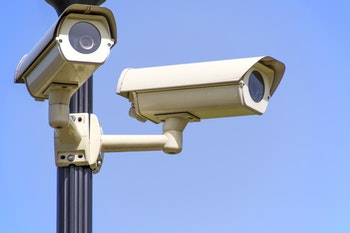CCTV has been a common fixture in shops, pubs, car parks and other public spaces for over a decade. Although we are now accustomed to seeing cameras on building and in public parks now, not everyone has welcomed their widespread introduction. For many people CCTV is intrusive: they see it as an affront and a threat to their civil liberty and privacy. For others, however, CCTV has been warmly welcomed. They value its reassuring presence, and take comfort from the fact that should anything untoward ever happen, then the culprits or perpetrators will be more easily identified.
The costs of CCTV technology have reduced over time: installation costs have reduced and prices have tumbled thanks to greater competition. Because of this the number of security-conscious home and business owners installing CCTV and wireless cameras in their properties has increased. But even though they may now be cheaper to buy, that doesn’t mean they’ll necessarily useful to every household. So, are CCTV cameras effective deterrents, should every security-conscious household be investing in one, and which type of CCTV system is best-suited to your home circumstances?
What sort of costs are involved when you install CCTV?
It’s impossible to give a ball park figure to that particular question, as it all depends on the scale and complexity of the system installed. However, in most countries the initial costs are probably far more reasonable than many might imagine. The price of a single wired CCTV camera with a night-vision range of 5 metres is minimal comparatively. Even more sophisticated security surveillance systems with several vandal-proof cameras wouldn’t necessarily break the bank.
However, there are also additional costs and expenditure that homeowners will need to make to get their systems up and running, and it’s important to bear this in mind. CCTV owners will also need to install additional equipment like connectors and a digital video recorder (DVR) to store and view the footage to complement the camera, although this does depend on the type of camera chosen.
Choosing wired or wireless CCTV
Wired home CCTV systems
Wired home CCTV systems are the most commonly used type of camera and, therefore, the cheapest. The connection between the camera and the monitor is achieved using a direct wiring link. The advantage of hardwiring is that signal will generally be consistent, and will only fail if there is a power outage or failure at the property. However, the downside to hardwired cameras, as well as their extension cables and connectors, is that they can be difficult to install, so a technician’s expertise might be required, making the initial outlay expensive.
Wireless home CCTV systems: how they work and what are their drawbacks?
With a wireless home CCTV system, cameras transmit images to a computer, tablet or mobile phone, using either analogue or digital technology. Many smart security cameras can even link to an app that you can use to monitor your home whilst you’re elsewhere. Digital cameras are generally higher quality and produce better images than their analogue counterparts, but they are consequently that much more expensive.
Wireless systems are not without their faults, however. They can be plagued by interference from devices like routers, cordless phones and microwaves, and can potentially be blocked and have their signal impeded by heavy masonry or metal objects. The ability to record and transmit film is also dependent on signal quality and consistency: so filming might be interrupted if an internet connection is lost. What’s more, wireless home CCTV systems will need to be encrypted, to prevent anyone within range with access to a suitable receiver viewing the homeowner’s images
Types of CCTV system
IP CCTV system
An IP CCTV camera is a networked digital video camera that transmits data over a Fast Ethernet link. IP cameras, also known as “network cameras” are most often used for IP surveillance – a digitized and networked version of CCTV.
The benefits of an IP camera over an analogue camera are numerous, but include, amongst others:
- Remote access/ administration from any geographical location.
- Digital zoom.
- The ability to send images and video easily anywhere where there is an Internet connection.
- Progressive scanning, enabling better quality images extraction from video, particularly for moving targets, and support for intelligent video
- Adjustable frame rates and resolution to meet specific needs.
- Two-way communication.
- The ability to send alerts if suspicious activity is detected, and
- Lower cabling requirements.
Despite the benefits, there are also disadvantages with IP cameras, including:
- greater complexity and bandwidth demands. Despite this problem, however, the growth in IP cameras continues exponentially, principally because of the superiority of digital technology over analogue technology.
- If you’ve already invested heavily in analogue technology, then it is possible to use a video server, which effectively turns an analogue camera into an IP camera. [The standalone video server converts analogue signals into digital format and provides analogue cameras with an IP address.]
Outdoor home CCTV cameras
Outdoor CCTV cameras, as the name implies, are designed to withstand the elements, but they must conform to certain standards to earn their rating. They must conform to IP (International Protection) rating 66 to be compliant. IP 66 housing is rated as waterproof under normal conditions, and it will also keep dust out of your IP camera too. Outdoor cameras are also rated according to the temperature range which they are able to tolerate. If a camera is likely to be subject to direct sunlight and high temperatures all day, then it’s wise to think about situating the camera in a more sheltered position. The same applies to continued wind and rain tolerate exposure in winter months.; if a camera is subjected to these conditions over a prolonged period, the equipment may malfunction or fail.
It’s important to remember that when you’re using CCTV cameras outside, that you’ll still need to run a cable to a suitable power source. Also you’ll need to position cameras where they can’t be tampered with, but where they are never the less accessible for maintenance and cleaning, and if the camera is likely to subject to any type of abuse or vandalism, invest in vandal-proof cameras. They are effective, but do cost more as you would expect.
CCTV footage resolution
What sort of quality are you likely to get with CCTV footage? Well, the cameras resolution is measured in lines. So, the higher the number of lines: the sharper the image will be. However, it should be noted that image quality is also affected by the size and type of chip that the camera uses.
In general, smaller CMOS chips produce lower quality images than larger CCD ones, such as 1/4″ and 1/3″. Cameras with smaller chips are also not as sensitive to light, so produce lower-quality images in low light. Light sensitivity – is measured in lux light, and ranges from 130,000 to 0.001 lux. The lower the lux, the more effective the camera will be at recording in low light.
Why is image quality important? Well, you’ll need high-quality images to be able to clearly identify people who trespass on your property. The evidence needs to be clear and unequivocal if it is to stand up in court. For the best quality images, it’s preferable to use high resolution cameras which produce high resolution images. The problem is these cameras are more expensive, and they can also take up a lot more storage space. Home CCTV feature
Storing CCTV images
Most home CCTV systems rely on a PC hard drive or standalone digital video recorder for storing images. The principal advantage of PC-connected systems is that they often come pre-loaded with software to view the images. Some DVR-based systems also have this facility, though not quite as many.
Make sure your system allows the storage of images in a widely used format, like Mpeg. Otherwise there could be problems if images ever need to be downloaded and viewed on other systems, such as those used by police forces.
Remote access
Some home CCTV systems, such as IP ones, let you check images over the internet using a PC or smartphone. Other options include email or text notifications when cameras are activated.
Night vision
Monochrome (black and white) CCTV cameras tend to be the most effective in low light, particularly when used with integral infrared illumination – a feature found on some cameras. It’s possible to use CCTV cameras that will film in colour during the day and switch to monochrome after dark.
Motion detection
Some CCTV cameras have a sensor that turns them on when they detect movement. This can be useful if you want to record frequently, but would prefer to reduce the amount of footage you’re storing.
CCTV and privacy
If you’re thinking of getting an outdoor home CCTV system for your property, you must comply with the appropriate privacy laws, and you must ensure your cameras are not pointed at public spaces, or other people’s houses or gardens.

